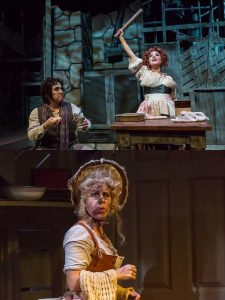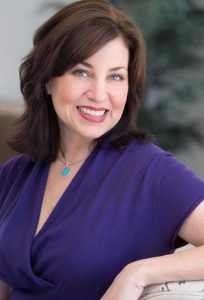
Top L-R Don Farrell & Judy Fitzgerald, Bottom Cynthia Collins in “Sweeney Todd” – Courtesy of Zach Rosing. Used with permission.
It is yet to be revealed what the long-term impact of the COVID-19 pandemic will be on world. I also suspect everything from here on out will be measured as “before Coronavirus” or “after.” As it applies to my own experience, though it wasn’t that long ago, it seems like it has been eons since I attended a live performance. Accustomed to seeing a play, musical or concert of some kind at least two or three times a week, the absence of these events has left a noticeable void in my life. But my loss pales in comparison to the pandemic’s toll on not just actors, singers, dancers and musicians, whose performances inspire, move and entertain us, but all the artists and craftspeople behind the scenes as well. One performance, the memory of which I still savor, was a spectacular concert version at Carmel’s Center for the Performing Arts of “Sweeney Todd: The Demon Barber of Fleet Street.” It was a joint production of the Carmel Symphony Orchestra, led by Conductor Janna Hymes, and Actors Theatre of Indiana, which I attended and reviewed in late February.
Starring in the title role of “Sweeney Todd” was Don Farrell, ATI artistic director and co-founder, and Judy Fitzgerald, associate artistic director, who played Mrs. Lovett. In a supporting role as the Beggar Woman was ATI associate artistic director and co-founder Cynthia Collins. The trio co-founded ATI in 2005. Since 2011, ATI’s home has been the Studio Theatre at the Center. It is Hamilton County’s only professional Equity theatre.
Over the years, I have reviewed numerous ATI productions in which the three have appeared. For me, the best performers are those who inhabit every character they play and are convincing, and these three are among the crème de la crème of local theatre. The fact that each always gives a 100 percent on stage is something I highly admire.
As an arts administrator myself, I also have a deep appreciation for what the co-founders have accomplished, particularly the way they have maintained the high artistic quality at ATI. As an artist and managing director, I also have empathy for them as they face an uncertainty that keeps them in limbo until the curtain goes up again. Curious to know about how they are coping, I reached out to the co-founders by email and asked them about their concerns and challenges amid the crisis.
How has the pandemic impacted ATI?

Don Farrell – Courtesy of Actors Theatre of Indiana. Used with permission.
Collins: Like the rest of the theatres in the United States, ATI had to cancel the remainder of its season, which isn’t fun. Actors, directors, choreographers, designers, crew…are all out of work because of the shutdown. Although we (ATI) were not responsible for the shutdown, we feel a certain responsibility to these people. As an Equity theatre company, it is part of our job to give professionals throughout our country much-needed employment. On the other side of the coin, we know this is what has to be done at this time for everyone’s safety and well-being.
Farrell: Like all other arts organizations, due to the COVID-19 pandemic, we had to cancel our 2019/20 season production of “Damn Yankees” originally scheduled to run April 24 – May 17. We are all practicing “stay at home” and connecting several times a week via Zoom for staff meetings and planning for our 2020/21 season. In an effort to keep in touch with our patrons and community, we launched our online Friday night Facebook Live program “Our Homes to Your Homes,” where my colleagues Judy, Cindy, our executive director Jim Reilly and I perform and chat. Last week, we had Mayor Jim Brainard on and this week he will join us again. We are reaching out to have guest visitors and this week is Chris Lewis, executive director of the Great American Songbook Foundation, and his wife Kelli will join as well!
Fitzgerald: Just the same as it had impacted all other organizations. We are disappointed, but have to be responsible during this tough time.
How have you been impacted personally?
Collins: Personally, I take things in stride. This is what we have to do and we will do it. I am disappointed that ATI will not be presenting “Damn Yankees,” in which I was preparing to do the role of Lola, but again, I need to look at the big picture…staying healthy and being responsible.
Farrell: These past couple of weeks have been, well, tougher than I thought. Living by myself, I find myself, at times, overwhelmed with bouts of anxiety and sadness when I allow myself time to think about my family in Georgia and friends all over whom I can’t see — my daughter, who is five minutes away from me whom I can’t take on daddy-daughter dinner dates or give a hug and kiss. I try to keep busy. Some days, I’m better at it than others. But I’m not alone with this. I think we all are feeling the pains of this. We are all in this together.

Cynthia Collins -Courtesy of Actors Theatre of Indiana. Used with permission.
Fitzgerald: Knowing that you can’t leave home unless it is absolutely necessary is difficult! Our daughter’s first year of high school is basically over. I feel so bad for all of the 2020 graduates!
How are you spending your time under quarantine?
Collins: Projects I put off at home are getting done. I can work out at home until my gym opens again. Every Friday evening, ATI has been doing Facebook Live. Half-hour shows with each of us singing and a different guest every week, including Mayor Brainard. All done from our homes, of course. So, every week, we pick material we will be singing and get it put down on tracks (done by our good friend Terry Woods). Rehearsing and performing our songs keep our brains active.
Farrell: I am still doing planning for our 2020/21 season, as much as we can do. I read, work in my yard, watch plenty of movies. I call and text my friends and family and sometimes Skype or FaceTime. That helps. I go jogging and rollerblading in my neighborhood and with my daughter when the weather is nice, but we always keep our distance from others.
Fitzgerald: Cooking, lots of cooking! Thank goodness that is something that I enjoy.
What is the pandemic teaching you?
Collins: Patience! And don’t take anything for granted
Farrell: How we are all connected no matter where we are. How people are loving and caring. I’m trying to learn that it is OK with being alone. I know I’m not the only one going through these feelings. It feels so beyond our comprehension right now. The truth is, it is OK to be a bit sad and anxious. And the best thing we can do right now is breathe through it and try to think, “What can I do to help someone who is going through what I am?” Doing the Facebook Live reach-outs helps me feel a little more connected to everyone.
Fitzgerald: To be careful and smart. Everyone thought it could never happen to them, but the growing numbers are staggering.
How can the pubic help ATI?
Collins: The biggest help of all is to keep supporting us by watching FB Live every Friday evening. Remember that we will be announcing our 2020-21 season in May. Know that ATI is here for our community. That we will keep the arts alive during this time. Being aware of all this, helps us immensely.
Farrell: If people are so inclined to help financially, they can donate to Actors Theatre of Indiana via our website at www.atistage.org or more directly here. Or they can text the words “GIVETOATI” to the number 44321.
Fitzgerald: To keep supporting us during this tough time. They can donate the cost of their tickets to “Damn Yankees” back to ATI and get a tax deduction for doing so. That would be a great help to us financially.
Do you miss audiences?

Judy Fitzgerald – Courtesy of Actors Theatre of Indiana. Used with permission.
Collins: YES, YES, YES! Singing to a camera isn’t quite the same. The energy you feel from an audience during a performance is what makes live theatre so exhilarating. The upside is, Judy and I have each other for an audience, so that helps.
Farrell: Very much so. They are such an important part of our ATI family. I was really looking forward to presenting “Damn Yankees” as was our entire cast and creative team.
Fitzgerald: YES! Live theatre is what we do. You can never replace the feel of a live audience.
Do you miss working with other performers?
Collins: Again, YES, YES, YES! The same holds true to this, as with an audience. It’s all about connection. Theatre is a collaborative profession. You are nothing without your fellow performer. Fortunately, Judy and I have each other to play off of during our FB Live broadcasts.
Farrell: You bet! Every time I work with artists and other performing groups, I learn something new.
Fitzgerald: Of course! Not being able to do our final show of the season is a huge disappointment! We had a lot of new performers that would have joined our ATI team.
What do you think the future holds for the performing arts as a result of the crisis?
Collins: The performing arts will come back stronger than ever. We are a powerful bunch and this crisis will only strengthen our passion to bring our talents, projects and messages back to the public. Everyone needs the arts and the artists in this country will be ready to kick it into high gear when the time comes.
Farrell: I hope others realize how important the arts are, especially in times like these. Could you imagine our world going through this crisis without the arts? Without art there would be no pictures in children’s books, no poetry, and no music. No movies and television. No paintings and pictures. The world would not only be a very dull and boring place, but we would lose our collective minds. Over the past decade, the practice of the arts has significantly decreased in schools because these activities are seen as less important to society. Some may see art as a waste of time, and that class time should be spent on core subjects. When people say, “If the times get tough and money is tight, the arts will be the first to be cut.” However, we all are experiencing now, in real-time, how the arts are saving us and our sanity. The arts are bringing us together. The arts are healing us, boosting our learning skills, providing an opportunity to express creativity and relieve stress. The arts are more important now than ever. I hope when this crisis is over, people remember how important the arts mattered to them and the arts still matters and will always matter.
Fitzgerald: I think it will be stronger than ever. The arts are getting us though this crisis.
What is your message to other artists?
Collins: Stay active. Keep your chops up. Do your part to keep the arts alive at this time. Take care of yourselves and your loved ones. Be ready to hit the ground running after this crisis is over.
Farrell: Keep creating. Keep being a bright and beautiful beacon of light to the world that is suffering in this time of darkness. Stay true to yourselves and know that you truly have such an important purpose to our world and our community. We artists are a noble bunch and I love each and every one of you.
Fitzgerald: Keep yourself busy and stay creative.





